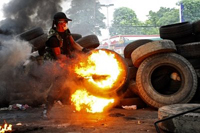Bangkok in flames after army storms protest camp
While many of the rioters were believed to be members of the Red Shirts and their sympathizers, there was also an element of criminals and young hoodlums involved in the mayhem in the city of 10 million people.
The protest and violence in Thailand has damaged its economy and tourism industry.
With the top Red Shirt leaders in custody, it was unclear what the next move would be for the protesters who had demanded the ouster of the prime minister's government, the dissolution of parliament and new elections. The protesters, many of them poor farmers or members of the urban underclass, say Abhisit came to power illegitimately and is oblivious to their plight.
 |
But that same violence also showed a serious intelligence lapse by the military, and the failure to secure areas of the capital raised doubt over how any unrest in the protesters' heartland of the north and northeast can be stilled.
Many Thais feel that any short-term peace may have been purchased at the price of further polarization that will lead to years of bitter, cyclical conflict.
"The Reds rampaged and committed to armed resistance," said Thitinan Pongsudhirak, a political scientist from Bangkok's Chulalongkorn University. "Right now, they are just burning buildings, but later on, what if they picked up arms to fight the bureaucrats, security forces in other parts of Bangkok, and especially in the countryside? So this is just the beginning. The crackdown didn't make them retreat fully. Things will get much worse still."
Thitinan said the government will need to seek a political settlement. "The problem now is that who does the government talk to?" he said.
Some point to former Prime Minister Thaksin Shinawatra, who was ousted in a 2006 military coup and fled into exile before being sentenced to two years in prison for corruption. The government has accused him of bankrolling the protests and refuses to make any deals with him until he comes back to serve his sentence.
The crackdown began soon after dawn Wednesday, as hundreds of troops with M-16s converged on the Red Shirts' camp, where nearby high-end malls and hotels have been shuttered by the prolonged protest.
Armored vehicles crashed through barricades of piled tires and bamboo stakes, and soldiers then gradually moved toward the protesters' hub, opening fire with live ammunition and drawing return fire from militant Red Shirts.
Bullets flew and several grenades exploded near the soldiers, forcing them to pull back briefly before pushing forward.
Among the dead was an Italian photographer. A Canadian freelance reporter was wounded by shrapnel and a reporter for the British newspaper The Independent was shot in the leg. Two other journalists were wounded earlier -- one Dutchman and an American documentary filmmaker.
The unrest spread outside Bangkok, with Thai media reporting that protesters set fire to government offices in the city of Udon Thani and vandalized a city building in Khon Kaen. Udon Thani's governor asked the military to intervene.
 0
0 






